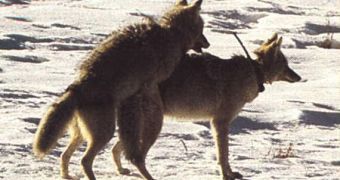Just one female cat can generate 420,000 offspring in its lifetime. Only in US, 7 million dogs and cats are euthanized annually. In Texas, the 3-4 million feral hogs have turned into a serious problem to farmers and ranchers. The elimination of large predators, like wolves and grizzlies, has led to a deer population boom in many areas. The smaller number of wolves led to an increased number of coyotes, and even wild horses require number control.
Now, killing wild or feral animals for their number control may no longer be necessary. Their reproduction could be cotrolled: a birth control pill for animals developed at Texas A&M University's College of Veterinary Medicine & Biomedical Sciences.
"Researchers are testing oral contraceptives -- used in much the same way as in humans -- and the results are promising," said co-author Duane Kraemer, a professor in veterinary physiology and pharmacology.
Wild animals would take the pill through baited food, but the contraceptive could most likely be applied in the case of pets.
"This approach inhibits maturation of the egg and therefore prevents fertilization. The animals continue to cycle, so it will not yet be ideal for many pet owners. But there is an advantage for use in wild and feral animals. The research team has recently started tests on domestic models for predators -- animals such as feral pigs and cougars -- but if successful, it could be used on a wide variety of animals, including dogs and cats. The team also has submitted grant applications for similar projects on coyotes and deer. The technical name for the drug is called a phosphodiesterase 3 inhibitor, and it is one member of a family of drugs being tested," said Kraemer.
Similar chemicals proved effective in lab tests made elsewhere in mice and monkeys, and in vitro experiments using cattle and human material.
"The compound can be mixed with animal feed and must be eaten daily during the critical time. It may also be encapsulated to decrease the frequency it has to be consumed. We are the first to test this compound for this specific purpose. When perfected, the pill could eventually be used as an oral contraceptive for pets, but that may be a bit in the future. In dogs, for example, the ovulation process is especially complex, but researchers are confident such a birth control pill can one day be successfully developed. One of the more interesting challenges will be to develop methods for feeding it to the target animals without affecting other species," said Kraemer.

 14 DAY TRIAL //
14 DAY TRIAL //